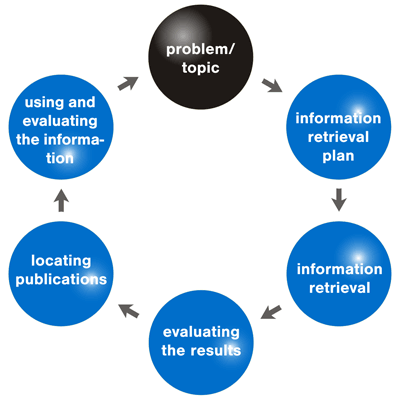Information retrieval process
Information retrieval can be described as a process that can be divided into different stages (see figure below). The figure below implies that the stages follow each other during the process, but in reality they are often active simultaneously and may have to be repeated during the same information retrieval process.

Picture: Cycle of information seeking
Process in detail
- Problem / topic: an information need occurs when more information is required to solve a problem
- Information retrieval plan: define your information need and choose your information resources, retrieval techniques and search terms
- Information retrieval: perform your planned information retrieval (information retrieval techniques)
- Evaluating the results: evaluate the results of your information retrieval (number and relevance of search results)
- Locating publications: find out where and how the required publication, e.g. article, can be acquired
- Using and evaluating the information: evaluate the final results of the process (critical and ethical evaluation of the information and information resources)
The amount of time needed for each stage varies, but as a whole, information retrieval is a time-consuming process, so you should start it as early as possible.
To avoid doing needless work and unnecessary mistakes, you should plan your information retrieval well and make notes of your plan, including the different stages of the process. A good information retrieval plan is especially important when the area of your research is broad. A well-documented plan is easy to return to later on when needed.